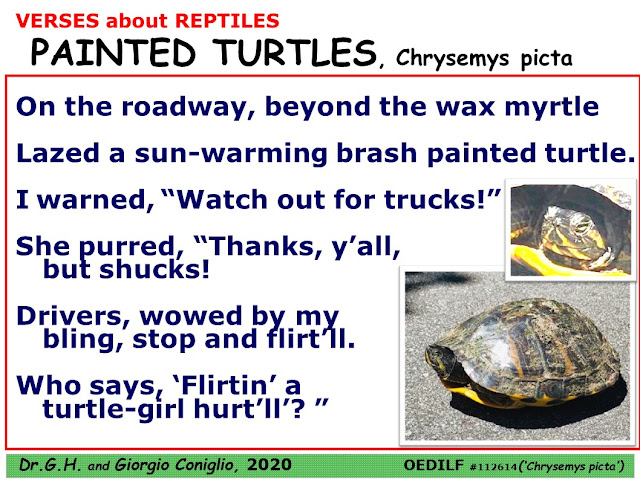A blogsite offering entertaining oddities since January 2020 at the rate of 30x/month. There are now over seventeen hundred posts in these four years. Images -- poetic (including song-lyrics), photographic, and computer-simulated -- are drawn from daily life as well as from poems and wordplay grouped by topic on our parent blog "Edifying Nonsense". The poetry displayed is all original (as are the song-lyrics), although portions evolved through rigorous editing on a collaborative website.
June 9, 2021
JUN 9, English literature survey course: the diary of Samuel Pepys
June 8, 2021
JUN 8, yesterday's excursion: Toronto Brickworks
June 7, 2021
JUN 7, life in Palindrome Valley: family relations
June 6, 2021
JUN 6, boating: Rose's canoeing lesson
June 5, 2021
JUN 5, old world palindromes #23 and #24
You can view the entire collection of 'Old World Palindromes' on our full-service blog "Edifying Nonsense"; start by clicking here.
June 4, 2021
JUN 4, Canadiana: 'Torontonian/Buffalonian'
June 3, 2021
JUN 3, to clot, or not: Virchow's triad
June 2, 2021
JUN 2, American satire: Georgia voters
June 1, 2021
May 30, 2021
MAY 30, reptiles: painted turtles
 |
a Canadian colleague (midland painted turtle) |
May 29, 2021
MAY 29, oncologic verses: cancerophobia
May 28, 2021
MAY 28, funny bones: AVN (avascular necrosis) of the hip
May 27, 2021
MAY 27, amphibians: Dominican 'crapaud'
Be sure to check out the whole collection of 'Amphibians' by proceeding to "Edifying Nonsense." CLICK HERE !
May 26, 2021
MAY 26, exotic destination: Chania, Crete
May 25, 2021
MAY 25, insects: ladybug dining
May 24, 2021
MAY 24, humorists' scurrilous talk: 'the titty'
May 23, 2021
MAY 23, to clot, or not: coagulation cascade (hemophilia)
May 22, 2021
MAY 22, curtained verse: sago palm's strobilus
Here in the South Carolina lowcountry, a 'severe' cold blast four winters ago damaged many sago palms, which are frequently used as a shrub or tree-shrub in local gardens, but last spring they seem to have bounced back with a show of male resilience.
You can review other mildly scurrilous illustrated verses in a wider context by proceeding to 'Curtained verse: Faintly Obscene (Selected) Limericks' on the full-service blog 'Edifying Nonsense'.
May 21, 2021
MAY 21, geysers: 'The Geysers', California
May 20, 2021
MAY 20, singable satire: Bob Dylan sings "A FICKLE TWIST of VERSE", part #2
PARODY-LYRICS, based on traditional poetry (limericks)
 ORIGINAL SONG: "Simple Twist of Fate" Bob Dylan 1975; covers by Diana Krall and Sean Costello are recommended.
ORIGINAL SONG: "Simple Twist of Fate" Bob Dylan 1975; covers by Diana Krall and Sean Costello are recommended.ORIGINAL POETRY: At Wikipedia (click HERE), you can find a discussion of limericks dealing with the 'man from Nantucket'.
PARODY COMPOSED: Dr. G.H. and Giorgio Coniglio, July 2016, followup to an earlier post.
1. "There once was a man from Nantucket" (clean version) - 3 verses, unattributed.
2. "There once was a man from Nantucket" (dirty version) - cleaned up by G.C.
3. "A dozen, a gross and a score" - Leigh Mercer
6. "There was a young belle of Old Natchez" - Ogden Nash
9. "A wonderful bird is the pelican" - Dixon Merritt
10. "There was a young lady named Bright" - Reginald Buller
11. "There was an old man of Peru" - Edward Lear
12. "There was a young fellow of Wheeling" - traditional
13. "Hickory dickory dock" - traditional
Chorus. "People say it makes them sick" - Giorgio Coniglio

“You flatter”, men believed,
And yes, they were deceived.
“No matter” if she flirts,
As she asserts in this Lewis Carroll
His bill holds more than his belican
10. A lady traveller named Miss Bright
Found the coach-door sign revealing.
I fear it had become my shtick,
But now I've lost the knack,
With no good jokes to crack --
A tendency perverse;
Blame it on a fickle twist of verse.
May 19, 2021
MAY 19, wordplay maps: American Scramble-towns 17,18
May 18, 2021
MAY 18, defining opinion: hormone
May 17, 2021
MAY 17, palinku (poetic novelty): hats
In this post, we will continue with a novel form of poetic wordplay. Inspired by the rather arbitrary European conventions for versions of Japanese-style haiku poetry, this new form is used for a terse verse with a total of 17 syllables displayed on three lines. Unlike its classic Japanese analogue, this concoction does not mandate the precise distribution of the syllables among the three lines, but does stipulate that each word in the poem be included in a palindromic phrase or sentence in English (i.e. one that can be read either forwards or backwards). Also, the authors concede that the typical themes of Japanes poetry cannot be incorporated easily in this new format.
To help the reader discern the origin of the lyrics, each palindrome (generally occupying one of the three lines of the poem) has been color-coded.
You can view all our "palinku" verses if you proceed with a single click to our more encyclopedic blog "Edifying Nonsense". Click HERE. (Or if you prefer, you can stay on this particular blogsite and look for the offerings for the 17th day of each month -- there are now more than 60 of these.)














































